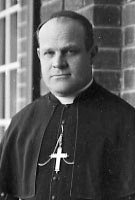Martinsburg missionary’s tale of a fourth, very Wise Man
“Kingdom Without Gunpowder” — Chow Kung’s original gift suddenly seemed inappropriate

Bishop Adolph J. Paschang (1895-1968) was born and raised in Martinsburg and graduated from St. Joseph School and later from Kenrick Seminary in St. Louis. He became a Maryknoll missionary, ministered in China and served as bishop of Jiangmen. 2021 will mark the 100th anniversary of his priestly ordination. He wrote the following Christmas/Epiphany story for Maryknoll magazine:
Chow Kung, personal geomancer, astronomer, expounder of dreams, and general wise man for the Han emperor, was alone in his gloomy study, preparing an important experiment.
He put certain proportions of saltpeter, sulfur and charcoal dust in the crockery jar, filled the jar with pebbles, and inserted a rice-straw fuse.
Then he touched a flame to the fuse and ran to cover behind a wooden cabinet in a far comer of the room.
There was a shocking blast. Shards of the wine jar scarred the walls, and pebbles crashed against the roof tiles. The experimenter fanned the acrid smoke from his face and smirked with satisfaction.
“It can do,” he muttered. “It is as I thought. It is good!”
After the smoke had cleared away, Chow Kung carefully inscribed the measures of the ingredients of his explosive mixture on a little plaque of bamboo and hid it inside his robes.
“Now,” he said, “my theory has proved itself. It is time I was on my way.”
The wise man walked through a series of courtyards and halls, to the private apartments of his master and patron, the emperor of China. (Because of his position on the palace staff, he had the privilege of audience with the ruler at any hour.)
He knelt before the lounging emperor and tapped the brick floor with his forehead.
“Great Man,” Chow Kung said, “this unworthy one craves leave to remove himself for a time from the radiance of Your Presence. “
“For what reason?” asked the emperor, languidly sipping tea. “To travel far under the sky in search of wisdom, and to bring it back for the glory of the Great Man’s realm.”
The “Great Man” grunted assent and lazily motioned with his long-nailed fingers for the petitioner to depart.
Chow Kung went from the royal presence gladly.
He felt no compunction for not having stated the true reason for the intended journey. He knew that no good, and perhaps some harm, would result if he were rash enough to tell his dissipated master that he was going to join a caravan of wise men from countries outside the Middle Kingdom — wise men who were following a strange, new star.
The shallow-minded emperor had no interest in the Sacred Books of the Jews or the tradition, much discussed among scholars of distant nations, which held that a Prince would be born who would conquer all within the four seas.
The Chinese wise man certainly could not tell his royal master about the secret discovery that would give the new Prince a new power, a new weapon, an explosive that would make his armies invincible. The Han emperor would want this weapon for himself and would use it for wicked purposes. But the expected Prince, the tradition said, would do only good to mankind.
Chow Kung intended to put his newly invented weapon in the newborn Prince’s hands, and to offer himself to be his wise man.
“What shall I take on my journey?” the Chinese wise man considered. “Gold or silver I need little of. There are sick people everywhere; my knowledge of healing herbs will secure from them, in return, the simple food I need. Ah, but I must take my sleeping-mat — that excellent, thick mat of fine grass, soft as hair, which I myself wove and which can be folded into a small package.”
The caravan followed the star, whiling away the days in earnest discussion of wisdom. When they entered the stable, the sight of the Child, lying in the manger, reassured them.
They knelt and performed acts of worship, each one according to the customs of his own nation. They offered their gifts to the Child, and they understood then the symbolical meaning of what they had been inspired to bring.
Chow Kung tapped the earth three times with his forehead, then gazed long upon the face of the Child.
At last he spoke to his companions:
“Among my people I am said to be wise in the reading of faces, and in the foretelling of human destinies. This Infant is, indeed, a Prince Who will conquer the world. But He will not do it by means of the weapon that was to be my gift for Him.”
The Chinese wise man then drew from within his garments the bamboo plaque inscribed with the secret formula of the explosive. With no hesitation, he took the plaque to the fire that was smoldering in a corner of the stable, and dropped his former treasure into the flames.
“But I have a better present for this newborn Prince — a present that is fitting for the kind of life that He will lead. Many a night this will ease his weary body.”
Chow Kung unfolded the sleeping-mat, soft as hair, which his own hands had woven, and gently spread it over the straw on which lay the smiling Prince of all mankind.
Comments
Other items that may interest you
Services
The Catholic
Missourian
2207 W. Main St.
Jefferson City MO 65109-0914
(573) 635-9127
editor@diojeffcity.org






